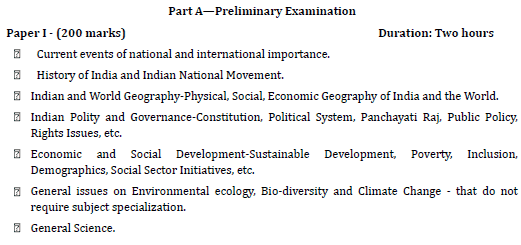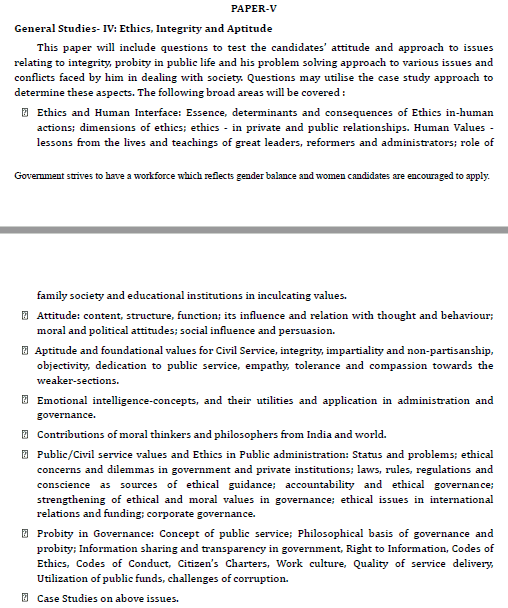The UPSC exam pattern is based on the tests conducted by old Indian empires such as the Mauryan Empire, Mughal Empire and the British era Imperial Civil Service tests to recruit civil servants.
Over the years, the UPSC, based on the recommendations of commissions such as the Kothari Commission has modified the UPSC exam patter to fit the needs of the times.
Broadly speaking, the Union Public Service Commission Civil Services Exam (UPSC CSE) exam pattern is that it is conducted in 3 elimination rounds.
Each Round has different rules and poses different challenges for you, the aspirant.

This article is everything you need to know about the UPSC exam pattern from Syllabus to strategy in a super-simplified manner.
UPSC exam pattern: 3 Elimination Rounds
The Union Public Service Commission Civil Services Exam (UPSC CSE) or the IAS exam is conducted in 3 elimination rounds which are-
- Round 1: Preliminary Examination consisting of Multiple Choice Questions
- Round 2: Mains Examination consisting of Essay-type questions.
- Round 3: Interview which is a face-to-face viva-voce.
You must qualify every round to proceed to the next one.
If you are eliminated in Round 2 or 3, you will have to start all the way from the beginning from Round 1 in the next year.
UPSC exam pattern for Prelims
Preliminary Examination or Prelims includes two examinations or Tests.
Test 1 of Prelims : CSAT or Civil Services Aptitude Test
Test 2 of Prelims: GS or General Studies
Test 1 of Prelims : Civil Services Aptitude Test (CSAT)
Rules
- All Questions are Multiple Choice Questions (MCQ).
- Broadly speaking, the questions will be of two types- English and Math.
- CSAT consists of 100 questions and lasts for 2 Hours.
- There will be negative marking for all wrong answers.
- This means that every questions will have 4 options out of which 1 will be correct.
- If you don’ t choose any option and leave the question blank, no marks will be deducted.
- If your answer is wrong, 1/3 marks will be deducted.
- You only have to score 33% marks to qualify.
- If you score above 33% , it will not effect your ranking or success in the IAS exam.
- If you do not score 33% you will be disqualified from the entire exam i:e Game over.
English portion
The English portion is to test your ability to communicate and understand things in English language. It will include questions like reading comprehension where a small English write-up about any random topic will be given and questions based on your understanding of the write-up will be asked.
The skills being tested for are- comprehension, interpersonal skills and ability for communication.
Math portion
Basic word problems and logical reasoning questions will be asked based on basic 10th-Standard Math. You will not need any complicated formulae or specialized knowledge.
The skills being tested are decision making, problem solving, basic numeracy and data interpretation.
What this means for you
What this means for you is that the level of questions will not be difficult and you don’t have to aim for a very high score. But at the same time, you must make sure you score more than 33% marks.
It is important that you spend some time practicing and get comfortable with the kind of questions in CSAT.
You can preview previous years questions of CSAT here.
Most likely, you already have enough skill and intelligence to clear the CSAT but sometimes anxiety can get the best of us. So make sure that you get used to the timed examination situation where you have 2 hours to solve 100 questions.
You can read about Time mastery in the exam here-
Solving a few previous year papers is recommended including a few timed-tests which you can do yourself with a stop-watch and alarm.
Test 2 of Prelims: General Studies (GS)
Rules
- All Questions are Multiple Choice Questions (MCQ).
- Questions will test your knowledge about a variety of topics listed in the syllabus. A detailed analysis of the syllabus is here.
- GS paper consists of 100 questions and lasts for 2 Hours.
- There will be negative marking for all wrong answers.
- This means that every questions will have 4 options out of which 1 will be correct.
- If you don’ t choose any option and leave the question blank, no marks will be deducted.
- If your answer is wrong, 1/3 marks will be deducted.
- You must try to score as much as possible. At least 60% marks are usually required.
- If you do not score above the cut-off, you will be disqualified from the entire exam i:e Game over.
- If you score above the cut-off , it will not effect your ranking or success in the IAS exam.
Syllabus of GS for Prelims
The syllabus of UPSC for GS Prelims consists of the following-

The syllabus seems very vast and it is not clear how to prepare as there are no prescribed books for the same.
You can preview previous years questions of GS here.
Lucky for you, I analysed the UPSC syllabus and found that ALL topics in the GS syllabus fall into one of the 4 categories listed below-
- India’s Context: The things in the wider world which effect India directly or indirectly.
- India’s Past: Historical events which shaped India into what it is today.
- India’s present: Where things stand in India now.
- India’s future: The challenges which India faces, efforts and potential remedies.
This classification goes beyond current and static portions. It also cuts across many disciplines which makes it easier to make inter-connections.
You can read about this highly simplified version of the IAS syllabus here.
You can read about the hidden messages in the UPSC syllabus here.
What this means for you?
Your GS score and the cut-off determines if you qualify for next round.
The Prelims is a highly competitive and tricky round to clear because of the General Studies paper.
Blind guess-work is sure to lead to failure because of the fact that you lose 1/3rd mark for every wrong answer.
Remember that there are 4 options for every answer so the probability of one being correct is 1/4. In other words, the probability of being correct by blind guesswork is 25%. And 75% probability of being wrong.
However, If you do get the right answer, you gain 1 mark (+1).
But the penalty of wrong answer is much higher. Since with every incorrect answer, not only will you lose the 1 mark which you would have achieved with the right answer, you lose an additional 1/3rd mark from your total score. So your total loss for every wrong answer is actually (-1.33).
The questions are often difficult and the answer choices can be very confusing and often you will be confused between two options.
Let’s say that you are able to eliminate 2 options out of 4 which you know are false, so you have 50% probability of choosing correctly.
But even at 50% surety, guess-work is risky.
Because with these odds, you will lose much more heavily if you are wrong (-1.33), than you will gain if you are correct (+1).
It all boils down to the fact that superficial knowledge will not suffice. You need in-depth knowledge combined with conceptual clarity to score more than the cut-off.
But not to worry- The GS score booster cheat-sheet can be found here to get you started.
UPSC exam pattern for Mains
Rules
- Mains exam consists of 9 tests or papers in total, each of 3 hours duration.
- All Questions are Essay-type. You will have to write answers with paper and pen.
- Out of the total, 2 papers are of qualifying nature which are Paper A Compulsory Indian language and Paper B English language.
- Your score in these 2 papers will not effect your ranking.
- But If you fail any of these, you are disqualified from the entire exam and will have to start from Round 1.
- Your score in the remaining 7 papers determines your selection and qualification.
- These 7 papers are: Essay paper 1, General Studies paper 2,3 &4, Ethics paper 5, Optional paper 6&7.
- If your combined score in all 7 of these exams is less than the cut-off , you are disqualified. Game over.
Paper 1 of Mains: Essay
The UPSC syllabus and notification tells you precisely what it is looking for in the Essay exam.

- Essay paper is the easiest paper in the civil services Exam to score very high marks in.
- You don’t need to be a gifted writer to write good essays.
- You hardly need any specialized knowledge about the essay topics.
- You don’t need to use flowery language in your essays. In fact, you should avoid it.
- You don’t need to memorize facts and data to write great essays.
A detailed anaylis can be found here-
Paper 2,3 & 4 of Mains: General Studies
General Studies encompasses 3 separate papers. The syllabus for General Studies paper 2, 3 and 4 has been compressed into one page for ease of use.

I recommend keeping this picture in front of your desk all throughout your UPSC preparation journey.
If I were you I would set it up as the background Wallpaper of my Computer or Phone to serve as a constant reminder of the UPSC exam pattern.
A detailed analysis of the UPSC mains exam for GS can be found here.
Paper 5 of syllabus of UPSC: Ethics
The Ethics paper is a new addition to the UPSC mains syllabus.
It is designed to test for values like integrity, empathy, tolerance etc.

The Ethics paper of the UPSC mains syllabus tells you the kind of qualities you should inculcate within yourself to be a good fit for the job.
In your career as an IAS officer or elsewhere in the Government, you may sometimes be making decisions that impact a large number of people. These traits are tested extensively all throughout the IAS exam but most specifically, in the Ethics paper.
By adding case studies in Ethics, the UPSC wishes to actually place you in a simulated situation and judge your response.
Paper 6&7 of syllabus of UPSC
Optional subject can be chosen according to preference.
You can choose amongst the following subjects-
- Agriculture
- Animal Husbandry and Veterinary Science
- Anthropology
- Botany
- Chemistry
- Civil Engineering
- Commerce and Accountancy
- Economics
- Electrical Engineering
- Geography
- Geology
- History
- Law
- Management
- Mathematics
- Mechanical Engineering
- Medical Science
- Philosophy
- Physics
- Political Science and International Relations
- Psychology
- Public Administration
- Sociology
- Statistics
- Zoology
- The literature of any one of the following languages: Assamese, Bengali, Bodo, Dogri, Gujarati, Hindi, Kannada, Kashmiri, Konkani, Maithili, Malayalam, Manipuri, Marathi, Nepali, Odia, Punjabi, Sanskrit, Santhali, Sindhi, Tamil, Telugu, Urdu and English.
There is no rule mandating that you should choose the subject of your graduation.
The only important thing to consider is that the difficulty level of the questions will be that of Honors or College level degree.
This is clearly stated in the UPSC notification.

The questions are essay-type of different word lengths ranging from word-limits of 20 to 600 words per answer.
You can read about how to write excellent answer-Essays here–
What this means for you?
As you read the UPSC exam pattern for the first time, it feels very intimidating. But I want to assure you that the IAS exam is not as difficult as it may appear.
However, it is cleat that it is a very different type of exam which is why It CANNOT be approached the way you approach exams in School or College.
That is because other exams have fixed structures- book lists, sources and syllabi. The UPSC exam pattern for preparation has no fixed rules. So how to approach the Mains exam?
Some vital clues are present in the official UPSC notification.

The emphasis of the UPSC on curiosity and Interest is evident from the first sight.
The UPSC is EXPLICITLY and DIRECTLY tells you how to approach this examination.

The word ‘Interest’ is mentioned THRICE in a single paragraph in the UPSC notification!
As a civil servant, you will sometimes be making decisions that impact a large number of people.
In real life, as in the civil services, there are always tricky choices to be made.
These decisions can have far-reaching consequences for others, and it is crucial to think about what those consequences might be and who all might be affected.

You will score more marks if your answers are well-formed, include more groups of people, and are appreciative of the complexity of real life.
ANd it’s all for the better because you will have to think differently to cover the entire UPSC mains syllabus in record time.
You can read about the hidden messages in the UPSC mains syllabus here.
UPSC exam pattern for Interview
Rules
- The number of candidates to be summoned for interview will be about twice of the number of vacancies to be filled.
- The interview will carry 275 marks and can last from 10 – 60 minutes.
- The interview board usually consists if 5 people who take turns in asknig you questions.
- Marks thus obtained by the candidates in the written Mains Examination as well as interview determines your final ranking.
- You will be allotted to the various Services keeping in view your final rank in the examination and the preferences expressed by you for the various Services and posts.
The interview is critical for your success. But the good news is that the the UPSC is very clear about what to expect from the interview stage

What this means for you?
I have observed the UPSC keenly over the past decade and I find that they stick to the notification very closely. Therefore, what they mention about the interview is exactly what you should expect.
Interview is not an interrogation meant to find faults in you. It is not a debate or an argument either.
Your skills at making intelligent conversation about important topics will be judged.
CONCLUSION
Why I wrote this article?
I write this blog because I want to disqualify the myth about this examination is one of the “toughest examinations in the world.”
I think that this misconception discourages A LOT of good people from even attempting this exam.
And for those who do start the journey, it leads to needless mental and emotional suffering.
If You are confused about how to clear the Civil Services Exam and all the different advice out there is driving you nuts, you can relax because your doubts will be put to rest here.
ABOUT ME
I never did well in school or college. My only interest was in Bodybuilding and Weightlifting.
The UPSC examination was the FIRST and ONLY competitive examination I undertook and was able to clear it three times in a row.

Joining the Indian Revenue Services IRS is the first and only job of my life so far. Honestly speaking, this is not because I have some exceptional talent or anything like that.
I just used a lot of tricks and techniques to make my life easier, which I share in the Cheet-sheets like the one below-
But something extraordinary happened to me during my preparation days- I fell in love with learning.
Psychology stopped being a subject I had to learn about just to clear the exam. It became the source of answers to many questions I had about human beings.
Philosophy became the teacher I never had. It blew my mind with wonder, and I remain in awe to this day.
Public Administration taught me about my future job. Studying public administration was like reading a long brochure about my prospective employer.
General studies taught me how to be insatiably curious about the world.
Through this blog, I hope to infect you with the same curiosity and love for learning, which took over me.
Because of the day that happens, you will have succeeded in your goal of clearing this exam.
To kick-start your UPSC preparation you should first take the UPSC SYLLABUS Challenge which is detailed here.
If you are wondering about IAS coaching institutes or whether to join one, you should first know the truth about what to expect-
If you are like most people who wish to attempt the exam while working, you will want to read this detailed analysis and insights taken from people who have cleared the exam while working.
I hope this article clarified some doubts for you. Let me know your thoughts in the comments below!


1 thought on “UPSC exam pattern: Super simplified”